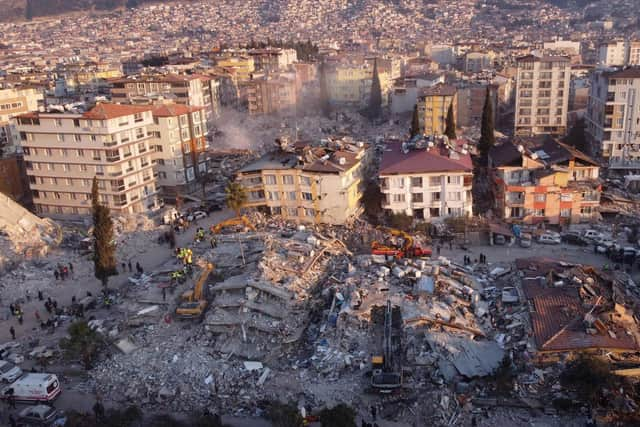Turkey Syria earthquake: Four-year-old girl pulled alive from rubble as time almost exhausted for rescues
The desperate search for anyone still alive entered what were likely to be its last hours in the wake of last week’s 7.8 magnitude earthquake, which has devastated parts of Turkey and Syria.
A crew pulled the girl from rubble in hard-hit Adiyaman, in southern Turkey. The rescuers were among thousands of local and overseas teams, including Turkish coal miners and experts aided by sniffer dogs and thermal cameras, who scoured flattened apartment blocks for signs of life.
Advertisement
Hide AdAdvertisement
Hide AdAs well as stories of near-miraculous rescues in recent days – many broadcast live on Turkish television and beamed around the world – tens of thousands of bodies have been found during the same period.


Experts say that, given the freezing temperatures – and the total collapse of so many buildings – the window for such rescues is now almost closed.
The quake and hundreds of aftershocks, some nearly as powerful as the first, struck south-eastern Turkey and northern Syria on February 6, killing more than 35,000 people and reducing whole swathes of towns and cities inhabited by millions to fragments of concrete and twisted metal.
Some 62 miles from the epicentre, almost no houses were left standing in the village of Polat, where residents salvaged refrigerators, washing machines and other goods from wrecked homes.
Not enough tents have arrived for the homeless, said survivor Zehra Kurukafa, forcing families to share the tents that are available.
"We sleep in the mud, all together with two, three, even four families," she said.
In the city of Adiyaman, 25-year-old Musa Bozkurt waited for a vehicle to take him and others to the city of Afyon, in western Turkey.
"We're going away, but we have no idea what will happen when we get there," he said.
Advertisement
Hide AdAdvertisement
Hide Ad"We have no goal. Even if there was [a plan], what good will it be after this hour? I no longer have my father or my uncle. What do I have left?"
Fuat Ekinci, a 55-year-farmer, was reluctant to leave his home for Afyon despite the destruction, saying he didn't have the means to live elsewhere and had fields that need to be tended.
"Those who have the means are leaving, but we're poor," he said. "The government says, go and live there a month or two. How do I leave my home? My fields are here, this is my home, how do I leave it behind?"
Volunteers from across Turkey have mobilised to help millions of survivors, including a group of volunteer chefs and restaurant owners who served traditional food such as beans and rice and lentil soup for survivors who lined up in the streets of downtown Adiyaman.
Other volunteers continued with the rescue efforts. After rescuers pulled out the four-year-old girl, a relative told HaberTurk television that more loved ones were inside the building.
As the scale of the disaster grows, sorrow and disbelief have turned to rage over the sense there has been an ineffective response to the disaster.
That anger could be a political problem for Turkish president Recep Tayyip Erdogan, who faces a tough re-election battle in May.
It also comes as Rishi Sunak declined to commit to increasing the UK Government’s £5 million support for devastated areas in Turkey and Syria, despite public support raising more than £65m.
Advertisement
Hide AdAdvertisement
Hide AdThe Prime Minister insisted the UK Government had provided “lots of other support” and was ready to provide more. But he did not commit to increasing the amount of match funding for the growing sum of donations to a public appeal set up in the wake of the disaster, when asked by broadcasters.
Meanwhile, on Monday, rescue workers, including coal miners, found a woman alive in the wreckage of a five-storey building in Gaziantep province.
But Eduardo Reinoso Angulo, a professor at the Institute of Engineering at the National Autonomous University of Mexico, said the likelihood of finding people alive was "very, very small now".
David Alexander, a professor of emergency planning and management at University College London, agreed. But said the odds were not very good to begin with.
Many of the buildings were so poorly constructed they collapsed into very small pieces, leaving very few spaces large enough for people to survive in, he said.
"If a frame building of some kind goes over, generally speaking we do find open spaces in a heap of rubble where we can tunnel in," Prof Alexander said. "Looking at some of these photographs from Turkey and from Syria, there just aren't the spaces."
Wintry conditions further reduce the window for survival.
Temperatures in the region have fallen to -6C overnight. In such cold, the body shivers to keep warm – but that burns a lot of calories, meaning people also deprived of food would die more quickly, said Dr Stephanie Lareau, a professor of emergency medicine at Virginia Tech in the US.
Many in Turkey blame faulty construction for the vast devastation, and authorities have begun targeting contractors allegedly linked with buildings that collapsed.
Advertisement
Hide AdAdvertisement
Hide AdTurkey has introduced construction codes that meet earthquake-engineering standards, but experts say the codes are rarely enforced.
At least 131 people are under investigation for their alleged responsibility in the construction of buildings that failed to withstand the quakes, officials said.
On Monday, authorities in the quake-hit province of Malatya issued warrants for the detention of 31 more people, while a construction supervisor and a technician were arrested in Kahramanmaras, the state-run Anadolu Agency reported.
Turkey's death toll from the quake has passed 31,000. Deaths in Syria, split between rebel-held areas and government-held areas, have risen beyond 3,500, although those reported by the government have not been updated for days.
Comments
Want to join the conversation? Please or to comment on this article.